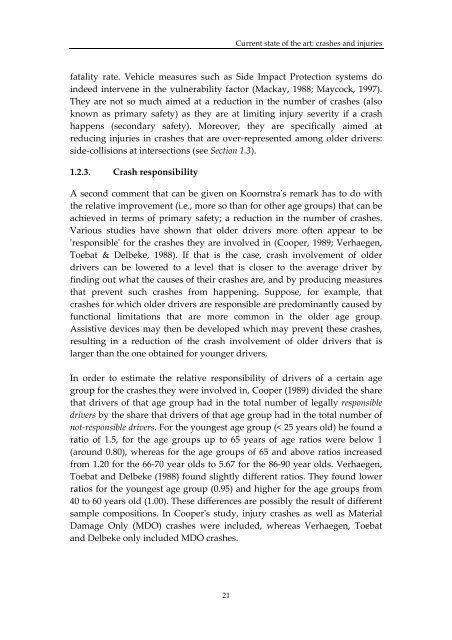Assisting the older driver - SWOV
Assisting the older driver - SWOV
Assisting the older driver - SWOV
You also want an ePaper? Increase the reach of your titles
YUMPU automatically turns print PDFs into web optimized ePapers that Google loves.
Current state of <strong>the</strong> art: crashes and injuries<br />
fatality rate. Vehicle measures such as Side Impact Protection systems do<br />
indeed intervene in <strong>the</strong> vulnerability factor (Mackay, 1988; Maycock, 1997).<br />
They are not so much aimed at a reduction in <strong>the</strong> number of crashes (also<br />
known as primary safety) as <strong>the</strong>y are at limiting injury severity if a crash<br />
happens (secondary safety). Moreover, <strong>the</strong>y are specifically aimed at<br />
reducing injuries in crashes that are over‐represented among <strong>older</strong> <strong>driver</strong>s:<br />
side‐collisions at intersections (see Section 1.3).<br />
1.2.3. Crash responsibility<br />
A second comment that can be given on Koornstraʹs remark has to do with<br />
<strong>the</strong> relative improvement (i.e., more so than for o<strong>the</strong>r age groups) that can be<br />
achieved in terms of primary safety; a reduction in <strong>the</strong> number of crashes.<br />
Various studies have shown that <strong>older</strong> <strong>driver</strong>s more often appear to be<br />
ʹresponsibleʹ for <strong>the</strong> crashes <strong>the</strong>y are involved in (Cooper, 1989; Verhaegen,<br />
Toebat & Delbeke, 1988). If that is <strong>the</strong> case, crash involvement of <strong>older</strong><br />
<strong>driver</strong>s can be lowered to a level that is closer to <strong>the</strong> average <strong>driver</strong> by<br />
finding out what <strong>the</strong> causes of <strong>the</strong>ir crashes are, and by producing measures<br />
that prevent such crashes from happening. Suppose, for example, that<br />
crashes for which <strong>older</strong> <strong>driver</strong>s are responsible are predominantly caused by<br />
functional limitations that are more common in <strong>the</strong> <strong>older</strong> age group.<br />
Assistive devices may <strong>the</strong>n be developed which may prevent <strong>the</strong>se crashes,<br />
resulting in a reduction of <strong>the</strong> crash involvement of <strong>older</strong> <strong>driver</strong>s that is<br />
larger than <strong>the</strong> one obtained for younger <strong>driver</strong>s.<br />
In order to estimate <strong>the</strong> relative responsibility of <strong>driver</strong>s of a certain age<br />
group for <strong>the</strong> crashes <strong>the</strong>y were involved in, Cooper (1989) divided <strong>the</strong> share<br />
that <strong>driver</strong>s of that age group had in <strong>the</strong> total number of legally responsible<br />
<strong>driver</strong>s by <strong>the</strong> share that <strong>driver</strong>s of that age group had in <strong>the</strong> total number of<br />
not‐responsible <strong>driver</strong>s. For <strong>the</strong> youngest age group (< 25 years old) he found a<br />
ratio of 1.5, for <strong>the</strong> age groups up to 65 years of age ratios were below 1<br />
(around 0.80), whereas for <strong>the</strong> age groups of 65 and above ratios increased<br />
from 1.20 for <strong>the</strong> 66‐70 year olds to 5.67 for <strong>the</strong> 86‐90 year olds. Verhaegen,<br />
Toebat and Delbeke (1988) found slightly different ratios. They found lower<br />
ratios for <strong>the</strong> youngest age group (0.95) and higher for <strong>the</strong> age groups from<br />
40 to 60 years old (1.00). These differences are possibly <strong>the</strong> result of different<br />
sample compositions. In Cooperʹs study, injury crashes as well as Material<br />
Damage Only (MDO) crashes were included, whereas Verhaegen, Toebat<br />
and Delbeke only included MDO crashes.<br />
21
















